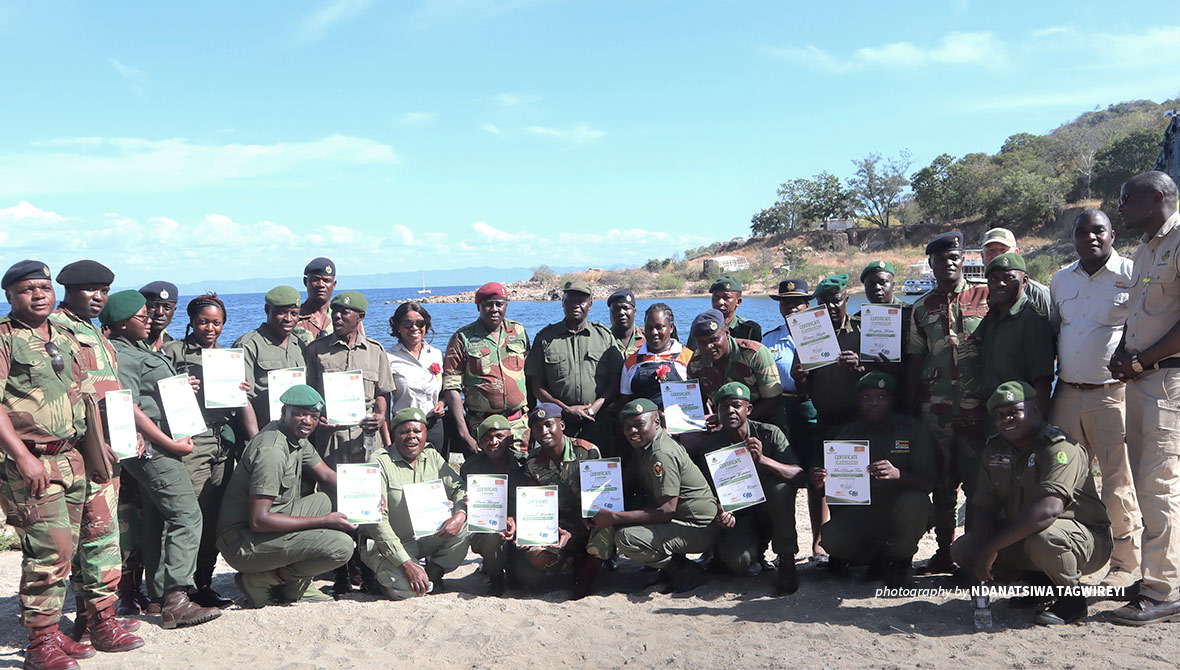AWF Registers the Graduation of 15 Advanced Coxswains for Anti-Poaching Patrols
General Inquiries
Tel:+254 711 063 000
Ngong Road, Karen, P.O. Box 310
00502 Nairobi, Kenya

(April 21, 2023 — KARIBA) The African Wildlife Foundation Zimbabwe (AWF) registered the graduation of 15 advanced coxswain trainees during a colorful pass out parade event held at Moth Camp in Kariba.
This followed an intense 3-week advanced coxswain course which equipped trainees with critical knowledge and skills on wildlife conservation with a particular focus on anti-poaching and law enforcement activities within marine or water-based environments. The training was made possible by the technical support from AWF in partnership with the Zimbabwe Parks and Wildlife Management Authority (Zimparks) and the Zimbabwe National Army (ZNA) Boat Squadron Regiment. The training is funded by the European Union (EU) under the Convention on International Trade in Endangered Species, Monitoring the Illegal Killing of Elephants (CITES MIKE) project.
The training covered the following subjects: handling of suspects, observing human rights in anti-poaching work, first aid, physical training, weapon handling, embarking and disembarking water vessels, ecology, routine ambush and raiding patrols, boat operations, and other relevant modules to improve river patrols.
The advanced coxswain training builds upon the first one in 2021. Trainees completed a 7-week course on skills required when conducting river patrols. All the graduates are holders of valid class 1 and class 2 Launch-Master certificates. Zimparks coxswains will be deployed in Lake Kariba, Hurungwe Safari Area, Chewore Safari Area, and Dande Safari Area to foster the biodiversity conservation mandate.
Out of the 15 graduates, 12 (including two women) came from Zimparks while three were from ZNA. Rosemary Kateguru, a ranger operating from the Zambezi River Specialized Anti-Poaching Unit (ZARSAU) scooped an accolade as one of the best Advanced Coxswain trainees. In December 2021, Kateguru, who hails from the Doma community, became the first Class 1 holder of the Launch-Master Coxswain certificate, which allows her to operate big boats in Zimbabwe.
“These trainings have continued to recognize the importance and capabilities of the girl child as we continue to value the need for gender balance and equality. I applaud [women] for continuing to defy the odds and for showing that female rangers can even outcompete their male counterparts by participating in more risky tasks such as operating in turbulent waters of Lake Kariba and other water bodies,” said Zimparks Director of Operations Arthur Musakwa, who addressed the pass out parade on behalf of Zimparks Director General Dr. Fulton Mangwanya.
He underscored the importance of support rendered by AWF in setting up ZARSAU, a water based anti-poaching specialized unit operating from below the Kariba Dam Wall to Kanyemba. He said, “This unit has become a vanguard for the conservation of the aquatic as well as terrestrial resources in the landscape as they have forged collaborative links with our Zambian counterparts. This support has continued to improve the efficiency of law enforcement and has also brought about desired conservation outcomes.”
AWF Zimbabwe Country Director Olivia Mufute noted that the training was very tough. “I am very happy with the thorough and rigorous advanced coxswain training that the rangers completed. These efforts will further strengthen the capacity and effectiveness of Zimparks rangers, particularly for rangers who conduct anti-poaching river and land patrols within the Mid-Zambezi Valley landscape. With these advanced skills, Zimparks rangers will be instrumental in conducting local as well as transboundary patrols and can contribute significantly to species protection and reducing illegal wildlife trade and trafficking.”
“The training of rangers on river anti-poaching patrols is in line with AWF Zimbabwe’s 10-year Conservation Strategy (2020-2030) which spells out the need to conserve Zimbabwe’s wildlife, reduce poaching and trafficking through supporting wildlife monitoring and protection systems. I believe concerted efforts from all stakeholders in the conservation circles will go a long way in conserving our megafauna and flora,” Mufute said.
Thomas Zhou, a 25-year-old ranger operating from Chewore North in Kapirinhengu area in the Mid-Zambezi Valley landscape won the best student award. He said, “Both coxswain trainings have benefitted us because the way we contact anti-poaching river patrols is now advanced compared to what we used to do before. Now we can conduct our river patrols in a professional way and now we know how to deal with poachers who dive into the waters to escape arrest among other issues,” he added.
“The training was tough this time… One would spend up to three hours swimming to enable him or her to deal with difficult situations,” said Rosemary Kateguru, noting the skills gained in arresting a suspect, ambushing, and other processes involved in anti-poaching river patrol work.
The training support, which includes courses on court procedures and digital wildlife monitoring, has helped to strengthen local and transboundary anti-poaching patrol effectiveness in the Mid-Zambezi Valley as shown by a number of joint crossborder patrols done by Zimbabwe and Zambia law enforcement agents.